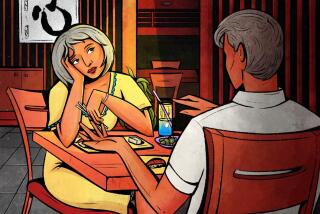BOOK REVIEW / NOVEL : An Anticlimactic Story of Love and Disappointment in France : MONSIEUR de BRILLANCOURT <i> by Clare Harkness</i> , A Thomas Dunne Book, $18.95, 208 pages
- Share via
Elizabeth Hardcastle has no idea that the landlord has fallen in love with her. All she sees is a genial, intelligent, upper-class, old and old-fashioned Frenchman so lonely for company that he has agreed to rent out part of his chateau for a few summer weeks. The arrangement suits Elizabeth perfectly; she can vacation near her friend Adlade (cousin to the landlord) in an unspoiled part of France while her children romp in the chateau pool. How could Elizabeth foresee the breaking of Virgil de Brillancourt’s heart?
“Monsieur de Brillancourt” is not, by any stretch of the imagination, a complex novel, but neither is it as rudimentary as the above description indicates. Yes, it is a simple and unadorned tale of unrequited love, yet it has charm, primarily its setting--the Ardeche region, south of Lyon--and the author’s unlabored voice. Although Clare Harkness writes plain, almost anonymous prose, her affection toward her characters is genuine and quite touching with regard to the guileless, trusting Brillancourt.
Living alone in, and responsible for, his ancestral home, the 67-year-old bachelor has had neither the inclination nor the opportunity for romance and, as a result, has contented himself with studying the local fauna and collecting books on the myriad topics that catch his interest. Brillancourt has but one sorrow--that the chateau doesn’t ring from time to time with children’s laughter, a void he overcomes by installing a pool.
The pool proves a major success with Brillancourt’s young relations, but disappointing to the host in that the children, being told not to impose on their aging relative, rarely enter the house. Brillancourt confides as much to his sister, who suggests that the chateau’s dreariness be remedied by letting a little-used wing to guests.
Elizabeth becomes the chateau’s first paying tenant, and it isn’t long before Brillancourt is infatuated with her, entranced by Elizabeth’s beauty, her manner and, above all it seems, her proximity. He is far too reserved and well-mannered to divulge his feelings for his tenant--she appears to be happily married, for one thing--and suffers, consequently, a sweet and silent torture.
This isn’t much of a story to build a novel on, but Harkness provides little else. There’s a subplot involving a nosy relative who becomes convinced that Brillancourt’s lovesick deportment is in fact well-hidden alcoholism, but it’s not very convincing nor very diverting; more entertaining are Brillancourt’s ingenuous, ineffective and essentially misguided attempts to win Elizabeth, through tours and discourses touching on local history, the purchase of a sports car and, finally, the arrangement of a records-and-phonograph dance party. Elizabeth is indeed impressed, but quite unaware that she is being wooed, that Brillancourt’s attentiveness and thoughtfulness mask a burning, longing soul.
In novels like this, the state of the protagonist’s tormented soul is usually revealed, for better or worse, before the story ends. That’s not what happens here, however, and the reader is likely to find Harkness’ unanticipated conclusion both disappointing and appropriate. Brillancourt has not been brought up to assert claims upon others, and Elizabeth feels nothing particularly special toward her landlord; neither wants, at bottom, the complications that the baring of souls, the discussion of possibilities, would bring. Elizabeth leaves the Ardeche, consequently, in ignorance, and although she will see him once more at the end of the novel, he is a changed man--and not for the better, for he knows by then what he has missed in life.
The ortolan is a famous French delicacy, a finch cooked whole and eaten in a few bites. Some readers may consider “Monsieur de Brillancourt” a similar treat, but this one, at least, finished the book thinking there should be significantly more meat on its bones.
More to Read
Sign up for our Book Club newsletter
Get the latest news, events and more from the Los Angeles Times Book Club, and help us get L.A. reading and talking.
You may occasionally receive promotional content from the Los Angeles Times.










